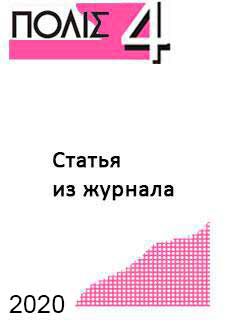Online shop of "Polis. Political Studies" Journal
We in the world, the world in us
Sardaryan G.T., Alekseyeva T.A. Secularization and Religiousness in the Optics of Constructivism. – Polis. Political Studies. 2020. No. 4. P. 124-138. (In Russ.).
Free!
secularity, secularization, constructivism, religion, political culture.
In the presentation of scientific literature in this field, modernization is, almost as an axiom, invariably accompanied by a loss of religiosity and the spread of secularism. However, the situation is not so simple and unambiguous. In the modern world, there are distinct trends that demonstrate both the erosion of secularism, and an increase of interest in religion, seen across a spectrum of ways, from fundamentalism to new trends and beliefs. In other words, political ideologies are yet to offer an unambiguous replacement for religious views. According to the authors, the interpretation and practice of religions is largely determined by the political culture of specific societies, their identity, historical mythology, traditions of societies, and so on; political culture, in turn, becomes a recipient of the latest versions of religious and secular views. In other words, context is crucial. Therefore, the European model is not at all universal. According to the authors, constructivism is an approach that allows the limits of Eurocentrism to be breached; significantly, Eurocentrism remains the typical attitude in many modern studies whose focus is only on statistical data, but does not connect with what is happening amidst the political culture of the respective countries and regions.
 English
English Русский
Русский

Reviews
There are no reviews yet.